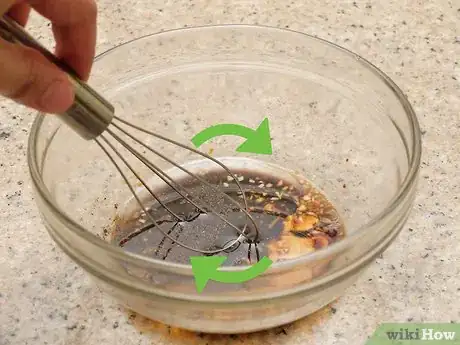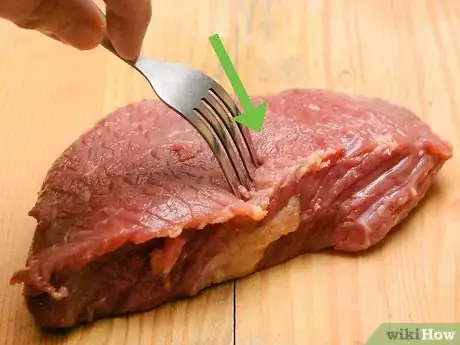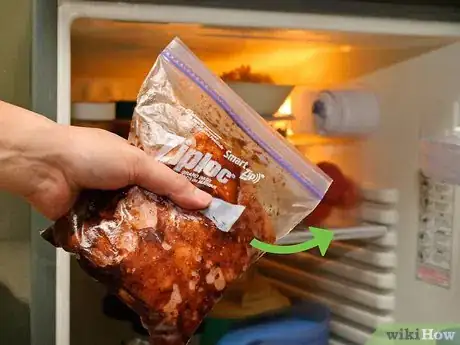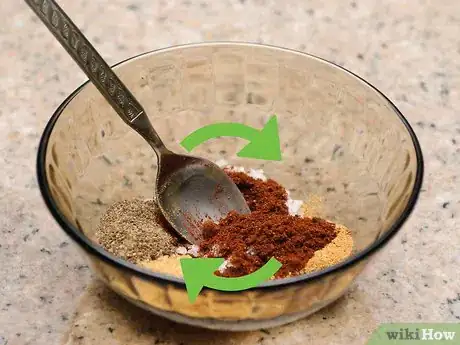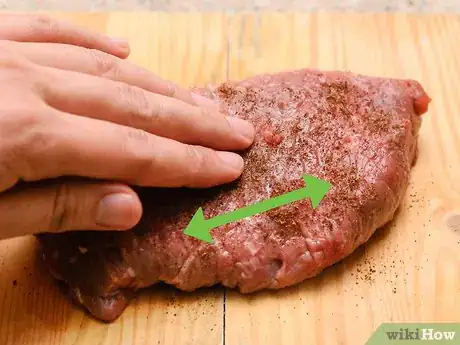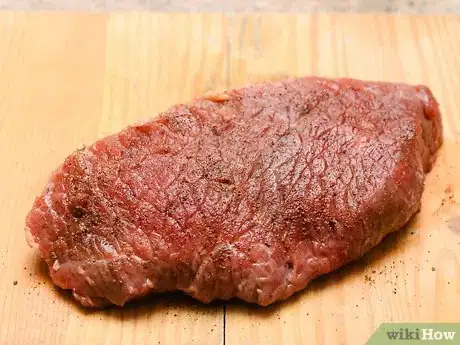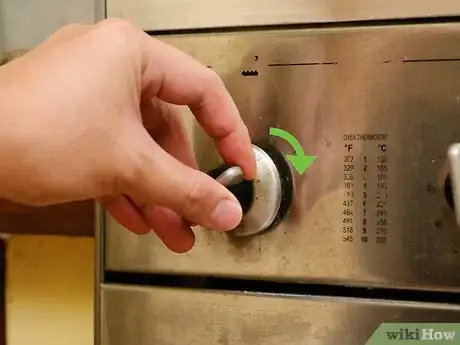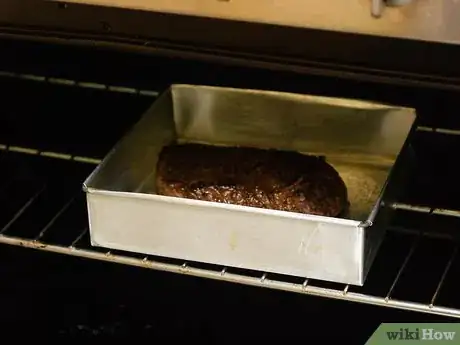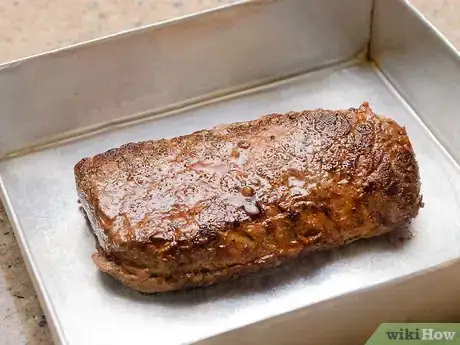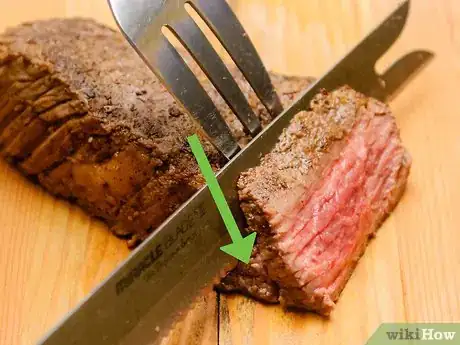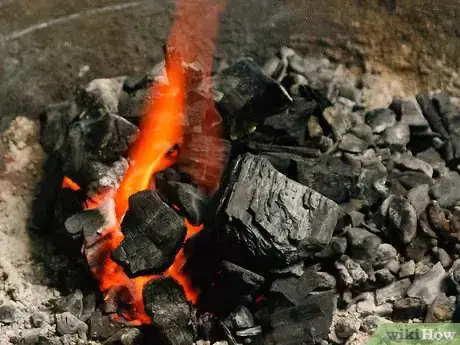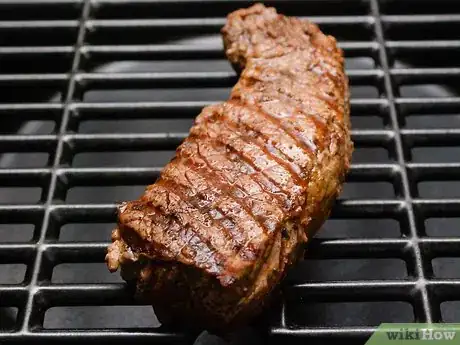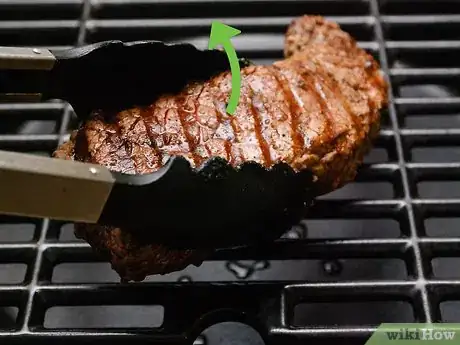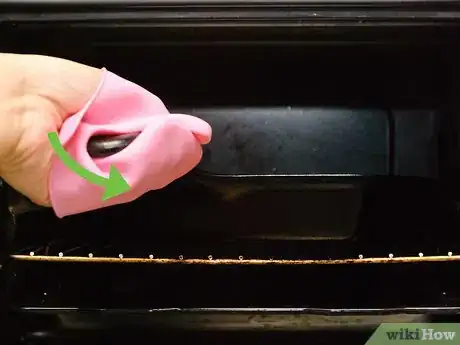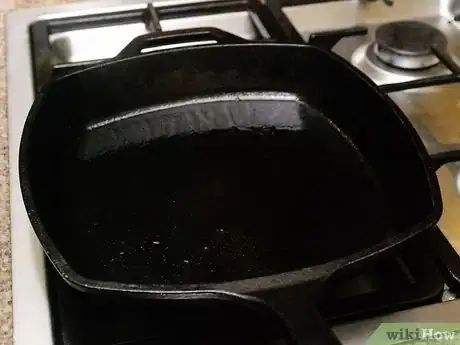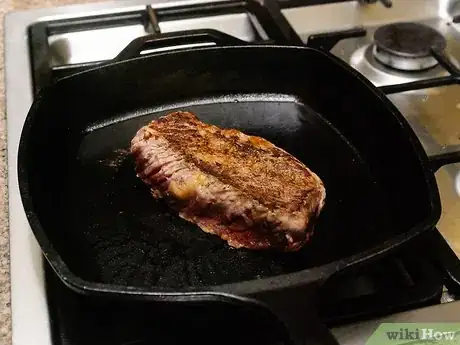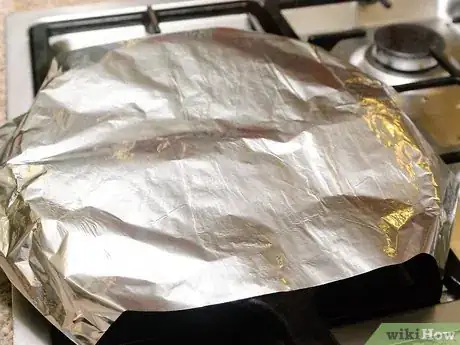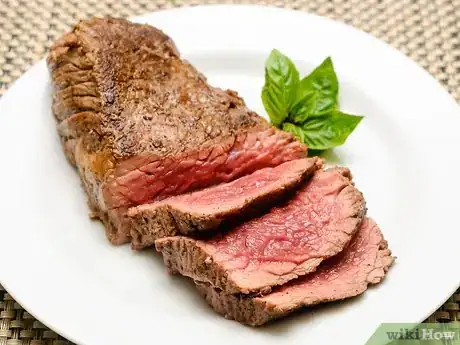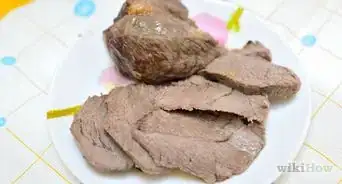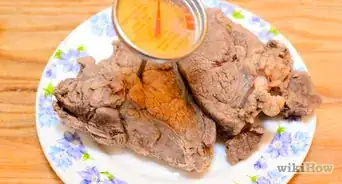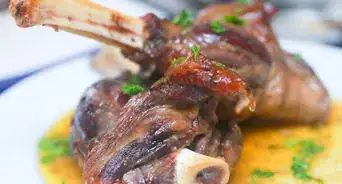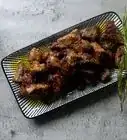This article was co-authored by wikiHow Staff. Our trained team of editors and researchers validate articles for accuracy and comprehensiveness. wikiHow's Content Management Team carefully monitors the work from our editorial staff to ensure that each article is backed by trusted research and meets our high quality standards.
There are 15 references cited in this article, which can be found at the bottom of the page.
This article has been viewed 72,877 times.
Learn more...
London Broil is a delicious and affordable cut of meat that you can purchase at most grocery stores or butcher shops. Unlike many other steaks, London Broil is a large top round piece of meat that can feed more than one person.[1] For this reason, it can sometimes be difficult to cook if you don't know what you're doing. Luckily, there are multiple methods to cook a flavorful and tender London Broil with common ingredients and a little effort.
Ingredients
- 1/2 teaspoon (2 grams) salt
- 1/2 teaspoon (2 grams) pepper
- 1/3 cup (78 milliliters) balsamic vinegar
- 3 tablespoons (44 milliliters) soy sauce[2]
- 3 tablespoons (42.54 grams) brown sugar[3]
- 4 garlic cloves, minced[4]
- 1 tablespoon (14.18 grams) Dijon mustard (optional)[5]
- 1 teaspoon (4 grams) garlic powder (optional)[6]
- 1 teaspoon (4 grams) ground cumin (optional)[7]
Steps
Marinating London Broil
-
1Mix ingredients in a large bowl. Using a whisk or fork, mix your salt, pepper, vinegar, soy sauce, brown sugar, garlic, and optional ingredients in a large mixing bowl. Incorporate all of the ingredients together and break up any large chunks of brown sugar.
-
2Pierce or score the London Broil with a fork. Pierce the top of the meat 3-6 times before putting it into the marinade.[13] Use a fork or knife for this and be careful not to cut through the entire steak.
- Piercing your London Broil will also help tenderize it.[14]
Advertisement -
3Transfer marinade and meat to a large zip lock bag and place it in the refrigerator. Leave your marinade in the fridge for at least two hours. To enhance the taste of your meat you can let it sit overnight.[15] Place your marinade bag in a bowl or a tray to ensure that the marinade does not leak out into your refrigerator.
- Flip your London Broil every 30 minutes in the fridge to ensure that both sides are marinated evenly.[16]
- Remeber to take your London Broil out of the refrigerator at least two hours before you have to cook it so it can reach room temperature.[17]
- You can discard your marinade or cook it down to make a sauce for your London Broil.
- Before cooking your London Broil, make sure to scrape off any pieces of garlic that may have stuck to your meat. If they are left intact while you cook it, they will burn.
Creating a Dry Rub
-
1Mix your paprika, salt, pepper and optional ingredients together. Mix your ingredients together in a large bowl, ensuring to break up any large chunks of spices that have stuck together.[18] Use a fork or mixing spoon to mix them together.
-
2Massage spices onto both sides of your London Broil. Rubbing spices into the meat to make sure that it will take on their taste.[19] You can apply butter or oil onto your London Broil to help the spices stick.
- If you want to retain the taste of the meat, use fewer spices for your dry rub. Ingredients like garlic or chili powder can overwhelm the taste of meat.
-
3Let your London Broil stand at room temperature for 15 minutes. Leaving a dry rub on for a longer period will make your rub more mushy like a paste or sauce. It may also help enhance the flavor of the meat, but has diminishing returns after one or two hours.[20]
Broiling London Broil
-
1Preheat your broiler and pan for 10 minutes.[21] Make sure to remember also to heat the pan you plan to cook on. The broiler uses flames to cook the meat, so check your stove's manual before utilizing it for any safety warnings.
- Use oven mitts or a thick dry rag when handling hot objects.
-
2Place the London Broil in your broiler for 4-6 minutes on each side. Slide your grill out and place the London Broil in your preheated pan. Place the London Broil on the top rack, or 4-5 inches away from the open flame.[22] Once it has cooked for 4-6 minutes, pull out your oven rack and flip the London Broil over with a large fork or tongs.
- Crack your oven door to prevent your London Broil from burning.
-
3Remove the London Broil from heat and let it sit for 10 minutes. Allowing your meat to rest before cutting it will retain its juices and enable it to finish cooking.[23]
- You can use a meat thermometer to ensure that your London Broil is done before serving. It should have an internal temperature of 130-135 degrees Fahrenheit (54-57 degrees Celcius) for a rare steak and 140-145 degrees Fahrenheit (60-62 degrees Celcius) for a medium-rare steak.
-
4Carve your meat against the grain before serving. Slicing against the grain of the meat will allow you to have a more tender piece of meat.[24] Find the direction in which the fibers are going, and cut along them rather than parallel with them.
Cooking London Broil on a Grill
-
1Preheat your grill and rack and apply a nonstick spray. Your grill should be hot before you place any meat on it. Using a nonstick spray will make it easier when you have to flip your London Broil.
-
2Place the London Broil on the grill and cook it for 9 to 10 minutes on each side. Set your grill to medium heat. You should cook your London Broil 4 inches above your coals. You know when one side of your meat is ready because of the dark caramelization that should form on each side.
- Don't move or flip your London Broil more than once, or it could cook unevenly and become tough.
-
3Remove your London Broil from the grill and let sit for 10 minutes. Move the London Broil to a separate plate and allow it to rest so it retains its juices and finishes cooking. Do not put your London Broil on the same plate that you used to hold the raw meat or you may get sick from cross contamination.[25]
Cooking London Broil in a Cast Iron Skillet
-
1Heat you cast iron skillet for three minutes. Set your oven to high to get your cast iron skillet very hot. This is essential for this method of cooking because the heat from the skillet will finish cooking your meat, not the heat from the stove's burners.[26]
-
2Apply butter, oil, or spray to your skillet. Applying butter, oil, or cooking spray will prevent your meat from sticking to the bottom of your skillet, especially if you are using a dry rub.[27] Make sure not to put butter or oil in the skillet for too long while you're preheating because it could burn and make your London Broil inedible.
-
3Cook your meat for three minutes on both sides. Briefly cook each side of meat, making sure that there is a dark black or brown caramelization on each side.[28] Overcooking the meat in the skillet will make it overly chewy.
-
4Tent your skillet with tin foil and remove it from the heat for 5 minutes. Create a tent over your cast iron skillet with a large piece of tin foil. The heat from the skillet should finish cooking the meat. Once you wait 5-10 minutes, make sure to test the internal temperature of your London Broil with a meat thermometer.[29]
-
5Finished.
Community Q&A
-
QuestionHow do I soften overly chewy, overcooked beef?
 Community AnswerIf you put the meat into a container and let it set in your favorite marinade, in the morning, it should be softer. You also could just cover it with sauce.
Community AnswerIf you put the meat into a container and let it set in your favorite marinade, in the morning, it should be softer. You also could just cover it with sauce.
References
- ↑ http://www.realsimple.com/food-recipes/shopping-storing/food/common-cuts-beef/london-broil
- ↑ http://www.food.com/recipe/guaranteed-winner-london-broil-159268
- ↑ http://www.food.com/recipe/guaranteed-winner-london-broil-159268
- ↑ http://www.myrecipes.com/recipe/marinated-london-broil-0
- ↑ https://healthyrecipesblogs.com/pan-fried-london-broil/
- ↑ https://healthyrecipesblogs.com/pan-fried-london-broil/
- ↑ https://healthyrecipesblogs.com/pan-fried-london-broil/
- ↑ http://cooking.nytimes.com/recipes/1017421-dry-rubbed-london-broil
- ↑ http://cooking.nytimes.com/recipes/1017421-dry-rubbed-london-broil
- ↑ http://allrecipes.com/recipe/74502/london-broil-with-mouth-of-fire-rub/
- ↑ http://allrecipes.com/recipe/74502/london-broil-with-mouth-of-fire-rub/
- ↑ http://allrecipes.com/recipe/74502/london-broil-with-mouth-of-fire-rub/
- ↑ http://allrecipes.com/recipe/14520/london-broil-i/
- ↑ http://www.canadianliving.com/food/article/how-do-you-make-marinating-cuts-of-beef-more-tender-pierce-them
- ↑ http://www.epicurious.com/recipes/food/views/grilled-marinated-london-broil-11835
- ↑ http://www.myrecipes.com/recipe/marinated-london-broil-0
- ↑ https://healthyrecipesblogs.com/pan-fried-london-broil/
- ↑ http://cooking.nytimes.com/recipes/1017421-dry-rubbed-london-broil
- ↑ http://cooking.nytimes.com/recipes/1017421-dry-rubbed-london-broil
- ↑ http://cooking.stackexchange.com/questions/53710/is-there-any-advantage-of-applying-dry-rub-overnight-for-baby-back-ribs-for-smok
- ↑ http://www.tablespoon.com/posts/how-to-cook-a-classic-london-broil/49fec4b5-ee7b-4007-b272-2c851b9d1ea7
- ↑ http://www.tablespoon.com/posts/how-to-cook-a-classic-london-broil/49fec4b5-ee7b-4007-b272-2c851b9d1ea7
- ↑ http://www.seriouseats.com/2009/12/how-to-have-juicy-meats-steaks-the-food-lab-the-importance-of-resting-grilling.html
- ↑ https://www.thekitchn.com/heres-exactly-how-to-slice-meat-against-the-grain-and-why-you-should-be-doing-it-meat-basics-215798
- ↑ http://www.eatright.org/resource/homefoodsafety/four-steps/separate/cross-contamination
- ↑ https://healthyrecipesblogs.com/pan-fried-london-broil/
- ↑ https://healthyrecipesblogs.com/pan-fried-london-broil/
- ↑ http://www.simplyrecipes.com/recipes/moms_pan_fried_london_broil_steak/
- ↑ https://healthyrecipesblogs.com/pan-fried-london-broil/
About This Article
To make London Broil, marinate the meat overnight or apply a dry rub to give it a nice flavor. For the fastest cooking option, broil the meat for 4-6 minutes on each side using the top rack of your oven's broiler. If you prefer to grill, heat your grill to medium and cook the meat for 9-10 minutes on each side. No matter how you cook it, let the meat rest for 10 minutes before serving it so can retain its juices and finish cooking. For tips on cooking London Broil in a skillet, read on!
